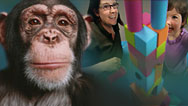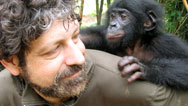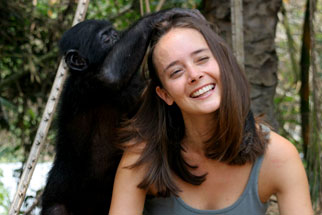Learning From Bonobos
- By David Levin
- Posted 08.05.10
- NOVA scienceNOW
Primate researcher Vanessa Woods says that when it comes to emotional intelligence, bonobos put the human world to shame. In this podcast, Woods talks to NOVA's Susan Lewis about the behavior of this remarkable species and what it can teach us about our own evolution.
Transcript
Learning From Bonobos
Posted August 5, 2010
DAVID LEVIN: You're listening to a NOVA podcast. I'm David Levin.
For an upcoming Web feature we're doing on animal intelligence, we spoke to a bunch of researchers who study animal behavior and communication. One thing they made clear was that intelligence doesn't mean just cognitive skill—it can mean emotional skill, too.
Vanessa Woods was one of our experts. She studies bonobos, a close relative to chimpanzees. She says that when it comes to emotional intelligence, they put the human world to shame. In this interview, she talked to NOVA's Susan Lewis about bonobos' unusual abilities.
SUSAN K. LEWIS: What can we learn from studying bonobos that we won't find out from looking at chimps?
VANESSA WOODS: So, for the last 40 years we've been looking at chimpanzees and chimpanzee cognition in order to tell us about ourselves. And you know chimpanzees are wonderful. They have the ability to experience love and grief and possibly even empathy. And they have these amazing political lives. But, just like us, they have this dark side. They hunt each other, they kill each other, they have war. They beat their females, they kill their infants. So they are a reflection of ourselves.
But bonobos, who are equally closely related to us, they have something that we don't. They have a way to maintain peace in their groups. And we really need to find out more about the psychological and emotional lives of bonobos so that we can learn how to do the same thing.
SUSAN K. LEWIS: What do you think is the key that allows them to be these "peaceful apes?"
VANESSA WOODS: What we think happens in bonobos is really their emotional lives. So chimpanzees and humans, if we sort of see someone as not belonging to part of our group—so with chimpanzees it could be an enemy male in their territory, with humans, it's people of a different sports team, or religion, or race—we really have trouble overcoming our emotions. We have these involuntary reactions. It's really part of our biology. Bonobos don't have that. So emotionally, when they hear the voice of a stranger, or they see a stranger, I mean, they're much more likely to groom them for half an hour and have sex with them than to attack them. And this is something that I think is really important to look at.
SUSAN K. LEWIS: So you don't see anger in bonobos?
VANESSA WOODS: You see anger, but not the murderous rage that you get in chimpanzees and humans. I mean, when we become lethally angry, we are gonna kill someone. Like just the other day, someone was murdered in this town that I live near. And I just wake up and I know that that's something that might happen to me.
When a chimpanzee wakes up in the morning, they know the same thing. There's a possibility that another chimpanzee will kill them. And bonobos, they just don't have that. And I would trade in everything that I have as a product of so-called human intelligence—I would trade in my car, my laptop, my iPhone, everything—in exchange for the feeling that a bonobo gets when they wake up in the morning, because they wake up, and there is no possibility that they are going to be killed by one of their own species. And I think that, for all our intelligence, this is something that we haven't been able to do, and we keep making the same mistakes over and over again. So to me, bonobos are the most important and the most intelligent creatures on the planet. And we need to figure out what they're doing so that we can do the same thing.
SUSAN K. LEWIS: How do they seem to—when there are conflicts, do you see them working out—doing kind of mediation conflict resolution in a way that seems smart?
VANESSA WOODS: So the way that bonobos maintain peace in the group is they have sex. The females have sex with the females. And the males do this thing kind penis fencing. And whenever there's any kind of little bit of tension they will go and rub their genitals on someone or something until they feel better. And we can relate to this, because how many people do you feel like killing once you've just had an orgasm? So they use this as their mechanism to reduce conflict and live together peacefully. Which I think is a good option. I'm not sure whether it's our option, but it's a good one.
SUSAN K. LEWIS: Can you address their cognitive skills in other ways, I mean, beyond this extraordinary ability to make peace, make sex—make peace with one another—do they have the same sorts of abilities to use tools that are so widely known for chimps?
VANESSA WOODS: It's interesting, because bonobos, in some ways their cognition looks a lot like human children. I mean, obviously not as developed. But they have the same sort of reaction to, say, seeing a new object. They'd be quite cautious, and a child would be quite cautious, as opposed to a chimpanzee who doesn't seem to have much fear at all. In terms of more learning abilities, they're quite good and they're quite skilled, but they seem to develop a little bit more slowly than chimpanzees. So chimpanzees are excellent tool users, bonobos haven't really been seen to use tools much in the wild, and it's probably just because they don't need to. Bonobos have a lot of food around, so it's not like they continually have to be inventing ways to find nourishment.
SUSAN K. LEWIS: You're so passionate about it—do you think that living among the bonobos has changed your perspective, or do you think that you had this perspective before and they've just reinforced it?
VANESSA WOODS: Bonobos just totally rocked my world. I had absolutely no idea—just like most people—I had no idea what they were, I had no idea really what their social system was like. And I had really no idea that there was an animal out there that could teach us so much.
SUSAN K. LEWIS: And do you think you're going to be continuing to learn from them?
VANESSA WOODS: Yeah, I can't see myself stopping working with bonobos. If I'm not studying them, then I'm going to be trying to help them in some way. We need to do something to stop them from disappearing forever. They're the most endangered ape. So there's only, you know, there could be as few as 10,000 left in the wild. And they are going extinct really, really quickly. And if we lose bonobos, we'll never get that secret. And if that happens, then we'll never understand ourselves.
Credits
Audio
- Produced by
- David Levin
- Interview by
- Susan K. Lewis
Image
- (Vanessa Woods with bonobo)
- Courtesy Vanessa Woods
Related Links
-

The Bonobo in All of Us
Primatologist Frans de Waal on what the "make-love-not-war" primate tells us about ourselves
-

Ape Genius
Experts zero in on what separates humans from our closest living relatives.
-

Our Family Tree
See (and hear) where you stand among the great apes in this audiovisual interactive.
-

The Gap Between Humans and Apes
Recent brain imaging research is offering new insights.
You need the Flash Player plug-in to view this content.




